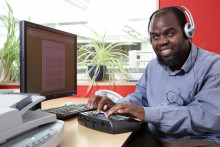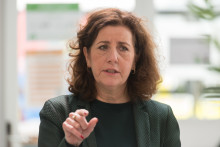How difficult is it to write a thesis if you are blind?
‘Quite difficult, I was faced with various challenges. In the beginning a student helped me every day to get from my home to the office. And because access to the internet is not so matter of course in Uganda as it is here, I still had to learn, for instance, how to search using Google Scholar.
I am the first blind researcher in this department and I am the only one in Twente who is doing research into ICT tools for blind people in Uganda. This meant there were few people with whom I could exchange ideas.’
Why did you decide to study access to ICT of blind people in Uganda?
‘I knew about the problems due to my own experience, but I had no idea about solutions. I hoped to gain some knowledge about technology that can help the blind.
I think it is rather special that I graduate tomorrow. In many countries there is a lack of recognition for people with a handicap. They are the minority, which is why they have to contribute to the solution themselves. I am proud that my thesis contributes to solutions for a group of which I too am a member.’
What were your most important findings?
‘It seems that few blind Ugandans are familiar with ICT tools such as screen-readers. What's more, they often say that they do not use them because of the costs, but I discovered that they also often ignore applications because they do not yet know how to use them.
Uganda is currently experiencing a sort of ICT revolution, with an increase in the number of places with good internet access. Many ICT laws are relatively new, however. No real policy exists for access to ICT for the blind, the deaf or people with a physical handicap.’
Do you make any recommendations?
‘Some form of programme should be developed for social support: people with a handicap must be given technical support. Friends and acquaintances can play a large part by helping the blind to find their way on the internet.
In addition, governments should draw up policy that concretely states which facilities should be provided for people with a handicap and how their access to ICT is guaranteed.’
Do your findings apply only to Uganda or could they be translated to other countries?
‘I think they will apply to many developing countries. After all, many such countries have relatively limited access to the internet.’
And are they useful to us here in the Netherlands?
‘Policy is not always up to date in some western countries either. For example, when I went to the bank, I realized that they did not have a cash dispenser with a speaking computer. Such cash dispensers do exist for example in the USA and in Sweden.’







